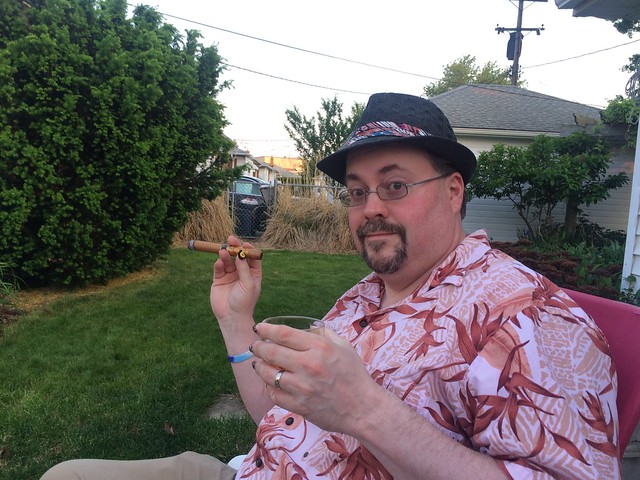Trying New Things, Or: Demonstrating My Vast Hatred Of Plants
The nice thing about getting older is that you get to keep trying new things, if you want. I’m well known for my crazy Hawaiian shirt and my hats and my fabulous pretty pretty princess nails, but those are only things I’ve started doing in the last five years. If you’d known me when I was twenty, I’d be famous for dressing only in black (I Neil Gaimanned before Neil Gaiman) and carrying a chair around with me everywhere I went.
So I figure, why not keep trying new things and seeing what fits?
One thing that’s been nice is Woodworking Wednesdays, a tradition I’m starting with Eric Meyer – on Wednesdays, Eric comes over and we attempt to build things with our limited knowledge. We’re both in intellectual, conceptual professions – web programmers and writers – so making something concrete with our hands is satisfying.
We’re not good at this woodworking, Lord no. Last night, we spent about an hour making test cuts with a router to try to figure out how the damn thing worked, then spent another ninety minutes endlessly measuring, clamping, and cutting to rout dado grooves for three shelves. It’s a slow process where we debate approaches, experiment, and then wonder oh Christ, we fucked up this cut by a quarter of an inch, how do we fix that?
But that’s the interesting thing: woodworking skill is largely about fixing your errors. You can measure all you want, but wood is an organic material and tools (at least at the casual woodworking level we’re willing to spend at) are imperfect. The truly skilled woodworker isn’t the one who makes no mistakes, she’s the one who can adjust to the flow of inevitable problems.
And there’s something heartening about that, I think. You’re gonna fuck up no matter how you plan. It’s how you recover that matters.


Then I visited my sweetie Raven down in Kentucky, and, well, kinda fell in love with Kentucky. Or if not Kentucky, I fell in love with bourbon, because going on a bourbon tour will make you at least a little swoony for new beverages.
But her friends are heavily into bourbon and cigars, and I didn’t know much about cigars, so when SB and DK brought me to a fine cigar store, we bought a bunch of cigars to go with the scandalous amounts of bourbon we purchased:

(Before you tell me this is not a scandalous amount of bourbon, this is about 80% of the bourbon we tried in Kentucky, and god damn, the Blanton’s is off the chain.)

Anyway, so we didn’t actually smoke cigars in Kentucky, because we were having so much fun sitting around a fire and talking, so we brought some home with us. And I had, fortunately, bought a book on “How to smoke cigars” which was highly entertaining because it was referencing a recent hurricane that had destroyed Cuba’s cigar crops, and I realized that hurricane was in the mid-90s, and this book was twenty years old.
But the funny thing is this:
Gini can’t read manuals.
I thought it was roleplaying, where I’d eagerly devour the rulebook and Gini would go, “What do I roll?” and flail around in the mechanics of the game, but as it turns out, Gini basically has a mental block when it comes to reading manuals of any sort. And so I enjoyed myself mightily in the tub reading all about how to smoke this damn cigar properly, the type of lighter you needed and how to light it properly (you don’t puff madly, you toast around the rim and let it burn), and how to smoke it (about one firm set of puffs every minute or so) and how most cigars turn foul about halfway down.
And so we went out in our garage and got out the bourbon and tried to smoke, and it was surprisingly enjoyable:


I thought I’d like the big dark cigar, but it turned out I liked the lighter Perdomo reserve taste. Gini, however, loved the big dark cigar in her mouth (and get your cheap jokes in now, folks). Cigar smoking is the sort of thing I can’t do too often, as my cardiologist will swing by and kill me, but it’s not as lung-damaging as you’d think – you’re not inhaling the smoke, just swirling it around in your mouth.
I don’t like the taste of cigarettes, but this was different – deeper, a little lusher, more satisfying. Also, because you’re just touching the surface, it’s not all in your throat, it’s just on the tongue and then you breathe it out; I find cigarettes pretty much invade my lungs, whereas this was a visitor in the parlor I could kick out whenever I pleased.
And it was relaxing. When you smoke a cigar, you really can’t do anything else – you just sit there, waiting calmly for the next puff, drinking in between.
Thing was, the cigar actually did turn, and holy God could we taste the difference – we got halfway down, and the smoke turned dragon-dung foul, and I’m so glad I read the manual, because otherwise I might have thought this was the cigar experience.
Again, another life’s lesson: you don’t have to smoke everything down to the stub. Even though you paid well for that stogie, it’s best to walk away when the experience sours.
I’m sufficiently a lightweight that I got a total cigar high – the rest of the evening, I was a little giddy. All the next day I was unable to taste things properly – there was a subtle slick on my tongue that neither mouthwash nor alcohol nor milk was able to remove – but then it went away and we were back to normal.
I could see us doing this once a week, when the weather is nice. It was surprisingly pleasant, sitting out with my wife and just shooting the breeze.
Plus, you know, I get to look like an old-fashioned mogul out on vacation with my ridiculous hat and shirt and now this silly cigar:

Polyamory's Not Your Vacation Villa
The problem with polyamory is that it’s often sold like a vacation getaway. “CAN’T GET YOUR KINKY SEX AT HOME?” the advertisements thunder. “THEN COME AWAY TO FANTABULOUS POLYAMORYVILLE, WHERE YOU CAN FIND THE BEATINGS OF YOUR DREAMS!”
It doesn’t have to be kinky sex, of course, and often it’s not. Sometimes the poly-billboards are as innocuous as “Hey, you like going out to flower shows, and your wife doesn’t! So let’s sweep you off to this Relationship Getaway, where you sniff roses with a person who likes the things your partner doesn’t!”
And you’ll see that Vacation Villa model of polyamory a lot: you’re a dynamic fun person with many interests, and no one person can fulfill all those interests, amiright? So when your partner gives the big shrug to doing something fun with you, find someone else who is interested! And fuck them! Fuck the shit out of ’em and Do The Thing!
Problem is, that often backfires subtly in poly models that have a primary center to them.
While on the surface, it seems logical – “Hey, my partner doesn’t like going to Magic tournaments, why drag them along?” – what happens in practice is that, well, you treat the new partners like WHOO VACATIONTIME LET’S POP SOME MARGARITAS.
Like any vacation, it’s great at first. You’ve got these new partners to go have all the exciting adventures your old partner didn’t want to do! He didn’t want to windsurf? Hey, you’ve got a windsurfer in your boudoir! She doesn’t want to try fireplay? You’ve got someone to stoke the flames with!
But slowly, if you’re not careful, you start thinking that Old Partner is the one you do Old Things with, and New Partners are where you do all your growth. It doesn’t help that Old Partner may be reluctant to try the new things that you’re evolving into, and so what you get at home is a stammering hesitance – “I dunno if I want to go on a road trip” – whereas new partners are all like “FUCK YEAH LET’S DO THE ROAD TRIP THING.”
Sometimes, it’s not even a refusal. It’s just a natural, stupid uncertainty. I know Gini and I have had these incredibly stupid moments where, fifteen minutes after we’ve decided we’re going to settle in for the evening and watch CLONE WARS reruns, someone comes running into the house with an amazing party we could attend with fireworks and ponies and otters.
And stupidly, we have a surly reaction: “We had plans! They weren’t good plans, but… now we have to put on a hat. Man, that hat seems like effort…”
Usually we shrug it off, because what we realize is that for a lot of people, “Change” takes a bit to acclimate to. There are those free spirits of you out there who are up for any adventure even if they’re flipping you out of bed at four in the morning – but for most of us, you gotta give us a minute to wipe the sleep out of our eyes.
So what happens starts to look like this:
“Hey, I wanna fly to Hawaii on a kite-string, whaddaya think?”
“Huh. I’m not sure if – ”
“Okay, fine, g’bye!” And they’re off sailing to foreign lands.
Eventually, you forget to even ask your partner, because you know what That Partner does, and that’s not the fun stuff, and so you quietly compartmentalize your life into WHEE WITH FUN PEOPLE and Oh Yeah, That Guy, and….
…it doesn’t work out so well. Your lives splinter apart, because you’re no longer sharing experiences. You evolve in different directions, because in the worst of cases they may even stop telling you what they love.
And when their love mutates and you don’t even understand what’s getting them off, it’s hard to keep it together.
What you gotta remember is that in a quote-unquote “primary” poly model, it’s perfectly fine to go off and do other stuff – don’t let anyone tell you otherwise! But never forget to give your partner the right of refusal. (Not the first right of refusal – that way leads to the abuse of quote-unquote “secondaries” – but a right.) If you decide you wanna take up target-shooting, or nipple torture, or the Paleo diet, ask them if they wanna come along. Give them space to decide, too, time to work past that initial reticence of STRANGE AND SCARY and possibly into lands of “Okay, so…”
And if it turns out you really really love something, even if they refused doing it with you the first time, tell ’em how important this is becoming to you, and ask ’em to give it a shot. The goal’s not to rope them into being joined at the hip with you – if they try target-shooting and it leaves ’em cold, great – but rather, to say, “This is a window to what I love right now. You may not enjoy it the same way I do, but can you see it? I want you to know me, even the parts you don’t fathom.”
Because the real danger with poly-as-vacation is that you start treating your old partner like the job. You condition yourself that the good times happen elsewhere. And when you start thinking of your partner as the thing you do in between the happy times, well, you’re doomed.
Any good relationship involves a set of shared experiences. You don’t have to – and in fact, probably shouldn’t be – doing everything together. But you should let ’em know what you’re doing, and what jazzes you, and even though they may say no ninety-nine times, maybe that hundredth time they’ll come along and you’ll find something neither of you thought you could love doing, and deepen the relationship instead of shrugging it off.
That ancient sage Snoopy once said that “Dogs don’t eat dinner, but we like to be asked.” And that act of asking can be powerful in letting your partner know that they’re welcome, and loved, and even if they sit on the couch while you’re off whapping each other with foam swords in a medieval reenactment, they’re still a part of your good times.
Even if those good times are as simple as “When I get home, I am gonna have so much to tell them.”
So What Was It Like To Read WATCHMEN Back In 1986, In Real Time?
There are currently thousands of kids who have no idea what it was like to wait years for the next Harry Potter installment. They just arrived, conveniently, in a world where all seven books were waiting for them. If they’re a fast reader, during a summer without much to do, they might mow through all of Harry’s adventures in less than a week.
Those of you who lived through the Harry Potter series, though, know that the experience of reading a series is changed significantly when you have to wait years to find out what happens next. It’s a far more interactive experience, because you can only get so far in the story before your mind whirls with theories on what might happen next. You re-read the existing chapters, searching for clues. You form deep and doomed attachment to relationships in the book, wanting, needing these two people to end up as friends, knowing that the next installment might shatter all your dreams.
Watchmen has been a unified graphic novel now for damn near thirty years. So it’s easy to forget at that one point, people were waiting months for the next issue to arrive at the comics shop, dissecting individual issues, unsure how it was all going to end.
Thing is, Watchmen was an entirely different beast from Harry Potter, as the fandom for Watchmen took place largely in a void. Harry Potter’s fandom was magnified by the Internet, where fans could gather in a virtual group to exchange theories, encourage each other to write fanfic; all we had in 1986 was BBSes, which weren’t nearly the same.
Basically, you’d talk over Watchmen if you had some comic-toting friends, but finding people as into it as you were was difficult at best. Fandoms were isolated islands: I don’t doubt some people had social groups where they all got together and dissected every panel, but I had my friend John and a couple of buddies down at the comic shop, and then my fandom died.
Then there was the issue of availability. If you wanted to get into Watchmen, there were no collected graphic novels, and back issues were hard to find. I lent out Watchmen a lot, particularly as the series went on, because people would get into it around issue #9, but because it was a fine seller they couldn’t find issue #4 in the racks.
Some people had a bizarre take on Watchmen, simply because they couldn’t find issue #1, #3, or #6, so they actually didn’t know what had happened in the beginning and tried to fill in gaps. Considering how continuity-heavy Watchmen was, that meant some people were really struggling to make sense of it.
Yet what I remember about reading the series in real time is disjointed:
- The EC Comics homages (with the pirate ship) were largely considered irritating, because we wanted to find out what the hell was going on with Dan and Rorschach and Doctor Manhattan, and here was this stupid comicky storyline elbowing out plot we wanted to read. It was as if you were desperate to find out what happened to Harry Potter, and instead was this cut-rate pastiche of Gilderoy Lockhart’s adventures taking up fifty pages in every book.
- Because of that, it was widely speculated (“widely,” in this case, meaning “in the Norwalk/Westport area I lived in”) that there would be some meta-crossover, where the comic-pirate world would turn out to be another “real” world like Watchmen, because why the hell would Alan Moore spend so much time on this thing if it wasn’t plot significant? (As it turned out, the answer was most likely “Because he only plotted six issues and needed filler.” In retrospect I’ve come to like the EC comics storyline more, as it’s very thematically correct, but when you’re mad to find out What Happens then “thematically” really clogs up the pipeline.)
- The reveal of Rorschach was, interestingly enough, largely met with a nod. None of us saw it coming (though, as with everything in Watchmen, the clues were there), but though I’m told other isolated groups of fandom reacted poorly to their grim-and-gritty power hero being a homeless fanatic, we thought it quite fitting. We also, correctly, saw Rorschach’s true nature as a critique of fandom – we noted our own poverty and dedication, and filled in the details.
- The thing that shocked us the most, over time, was Rorschach’s humanity. If you look at the early comics, imagine reading repeatedly for basically seven months (there were mild production delays, IIRC) and seeing Rorschach as this cold, callous element of destruction. He destroys his old enemy, albeit accidentally. He even destroys his psychologist. So when that first moment came when he apologized to Dan, offering the handshake awkwardly, that was like a bomb going off for us. The idea that Rorschach could evolve made the series feel like it could go anywhere – you may note that of all the characters, Rorschach is the only one whose non-superhero name I don’t innately recall – and so when he started to change, we felt completely at sea.
- The truly weird thing in retrospect is how strong we believed the female characters were in Watchmen. And this is what I call “Star Trek Syndrome,” where you have a work of fiction that’s groundbreaking and progressive at the time, and then as society evolves the original show becomes an embarrassment. The Original Star Trek, with Captain Kirk, was actually really progressive – they let women on the bridge, and occasionally let them be doctors! – yet as the years passed and “women on the bridge” became an expected thing, all the other bits of Kirk slapping them on the ass and seducing all of them made him look like a troglodyte. Likewise, you see that with Joss Whedon – Joss is getting so much flak for being “not a feminist” these days, but when Buffy the Vampire Slayer was made, it really was feminist-progressive for television. It’s just that twenty years later, we’ve got higher standards.
- So yeah, in retrospect, the “rape turns into love” plotlines are embarrassing in Watchmen, and Laurie’s ham-handed mother issues don’t hold up too well, but at the time having a woman characterized as equally as a man was so shocking to a comics industry that usually had women as walking plot devices. Hell, having a complex relationship with her mother – a scene where they just talked! – was pretty groundbreaking to a bunch of nerds who were used to having women catfighting a la Lois Lane and Lana Lang. And even now, Laurie’s being front-and-center as someone whose opinion matters, where in a very real sense the whole plotline involves Manhattan convincing her of the correctness of his vision and vice versa, is something you don’t see terribly often in comics. Even if Laurie doesn’t make her argument explicitly, convincing Jon by the sheer nature of her raw emotions.
- The fan theories only really exploded once it was revealed that Adrian was the main villain – though we were all wildly incorrect as to how that would work. Before Adrian, we were convinced the series was en route to a team-up, where they’d find the villain and punch him (which was, to be fair, the standard plotline in comics before that, and again, to be fair, this was the stunted fan theories of a couple of comics nerds in a sedate town).
- Even back then, we also bitched extensively about Adrian’s super-crappy password and lack of biometrics.
- After Adrian was revealed as the villain, however, we were unsure. We correctly saw the nuclear destruction out there, and were half-convinced the missiles would fly with a nuclear holocaust. We thought he might be brainwashing politicians, as there was some evidence of his manipulating the media well. We knew about the alien biology, yet didn’t understand what that meant. We trusted that Alan Moore would bring it through.
- Okay, and you can bitch about your cliffhangers -but after reading for almost a year, “I did it thirty-five minutes ago” remains one of the most shocking plot twists I’ve ever seen anywhere, in any media. It’s good in the book; imagine waiting for eleven months to get there, convinced the protagonists were gonna save the day through luck and spunk, then realizing that a) they had failed, and b) we’d have to wait several weeks to find out what happened afterwards. Jesus.
- And we felt like, well, he kinda didn’t. The annihilation of New York was shocking, and watching all the side characters we’d come to love get destroyed had the emotional effect, but I remember feeling at the time like, “That’s it? That’s his plan?” And it’s kind of like the Ewoks in Return of the Jedi in that we liked everything surrounding that – his motivations, the worldwide reactions, the fact that his plan actually succeeded – but the actual destruction itself felt like, really? Alien flops on top of Manhattan? Fine. I didn’t watch the movie, but when I found out they were changing that aspect, I remember nodding my head and going, Yeah, that’s probably for the best.
- At the time, we felt like Laurie’s “Let’s fuck” was really simplified, and not quite as beautiful as Moore meant it to be. I thought that was because, maybe, I didn’t have a lot of experience with sex, or funerals, and with time I’d come to understand the fullness of it. And nope; I know what he’s getting at with “Tandoori to go,” but the scene still feels a little creepy to me, Mister Alt-Sex Polyamory dude. Maybe some love it.
- We did, however, agree that the ambiguity of the ending kicked ass, and I think part of the reason Watchmen continued to have such an effect for years after is that you could always ask any group of nerds “So did he pick up the right package? Should he pick up the right package?” and get a spirited debate going.
Thing is, for all its flaws, Watchmen is deep in my writing-DNA. It hit me when I was growing up, and to this day when I plot I wish I had the clockwork finesse of Alan Moore. Afterwards, I went on to read Swamp Thing (and if you think back issues for Watchmen were hard to find, imagine getting forty issues of a not-particularly-popular series that only had the first seven issues in graphic novel form), and that really turned me on to what good prose in comics could do.
I know, objectively, Watchmen has flaws. Realistically, however, internally, to me, it’s flawless, such an overwhelming cauldron of ideas that even its errors somehow attain magnificence. And a large part of that is due to reading and rereading it obsessively, one month at a time, as the issues came out.
If you had your personal experience back in the day, reading it before the graphic novel, I’d love to hear them.

